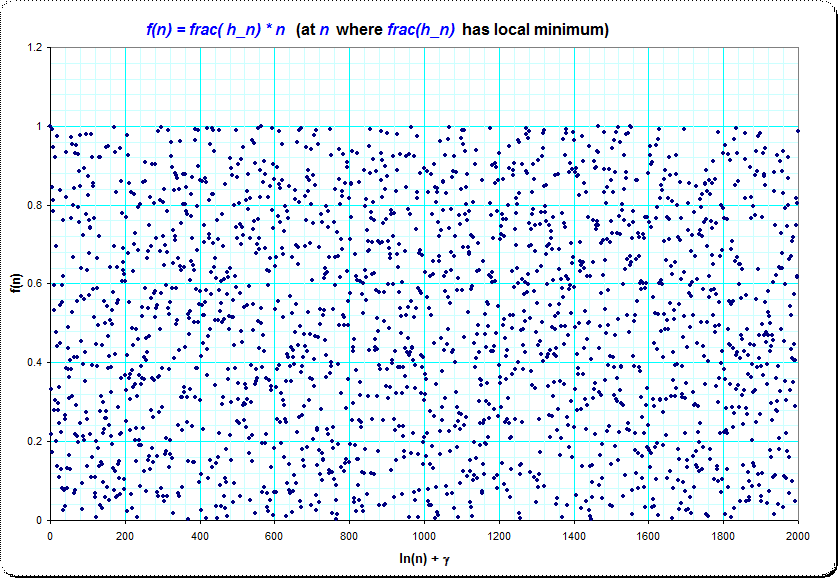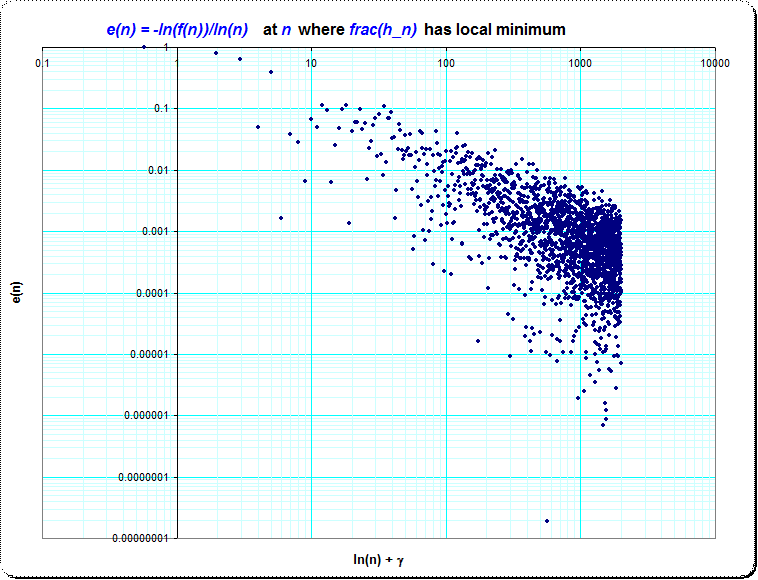The set $\small M(0.1,2000)$$\small M(0.1,e^{40})$ (represented by 40 rows) is here the set of all $n$ where $\small f(n,0.1)=w_n \cdot n^{0.1} \lt 1$ . The number of such entries for $\small n=132159290357566703 \approx 10^{17}$ is here 7 .
{find_n(k)=local(n1,n2,a1,a2);
n1=floor(exp(k-Euler)); n2=n1+1; a1 = A(n1);a2 = A(n2);
if(a1<a2,return(n1),return(n2));
}
\\ create that list one time, then evaluate cardinality for various eps
\\ using that same list
{makeList(listlen=40)= local(list,n,w1,logn);
list=matrix(listlen,4);
list[1,]=[Euler,0,0,0];
for(k=2,listlen,
n=find_n(k); logn=log(n);
list[k,]=[logn+Euler,n,w1=w(n),-log(w1)/logn];
);
return(list); }
\\ compute cardinality with some eps
cardM(eps,list) = sum(k=1,#list[,1],list[k,4]>eps)
\\ apply, note: for long lists we need high internal precision
list = makeList(40) \\ the max N is here about e^40
print(cardM(0.1,list) )
$$ \small{ \begin{array}{lll} A(n) &\lt & {1\over n^1\cdot n^\varepsilon}\\ f(n) \cdot n^\varepsilon &\lt & 1\\ \ln(f(n)) + \varepsilon \cdot \ln(n) &\lt & 0 \\ {\ln(f(n)) \over \ln(n)} + \varepsilon &\lt & 0 \\ \varepsilon & \lt& -\ln_n(f(n)) \end{array} }$$$$ \small{ \begin{array}{lll} A(n) &\lt & {1\over n^1\cdot n^\varepsilon} & \text{ from OP}\\ f(n) \cdot n^\varepsilon &\lt & 1\\ \ln(f(n)) + \varepsilon \cdot \ln(n) &\lt & 0 \\ {\ln(f(n)) \over \ln(n)} + \varepsilon &\lt & 0 \\ \varepsilon & \lt& -\ln_n(f(n)) \end{array} }$$
epsilon |M(eps,nN)| |M||M(eps,nN)|
n<=e^1000N~e^1000 n<=e^2000N~e^2000
-------------------------------
0.0000 1000 2000
0.0010 633 862
0.0020 430 482
0.0030 315 330
0.0040 258 264
0.0050 204 205
0.0060 171 171
0.0070 151 151
0.0080 135 135
0.0090 120 120
0.0100 109 109
0.0110 100 100
0.0120 98 98
0.0130 89 89
0.0140 84 84
0.0150 79 79
0.0160 73 73
0.0170 69 69
0.0180 62 62
0.0190 57 57
0.0200 55 55
0.0210 50 50
0.0220 47 47
0.0230 44 44
0.0240 42 42
0.0250 41 41
0.0260 39 39
0.0270 39 39
0.0280 37 37
0.0290 37 37
0.0300 36 36
0.0310 36 36
0.0320 36 36
0.0330 36 36
0.0340 34 34
0.0350 34 34
0.0360 34 34
0.0370 33 33
0.0380 32 32
0.0390 31 31
0.0400 29 29
0.0410 29 29
0.0420 29 29
0.0430 26 26
0.0440 26 26
0.0450 25 25
0.0460 25 25
0.0470 24 24
0.0480 24 24
0.0490 23 23
0.0500 21 21
0.0510 21 21
0.0520 21 21
0.0530 20 20
0.0540 20 20
0.0550 20 20
0.0560 20 20
0.0570 19 19
0.0580 18 18
0.0590 18 18
0.0600 16 16
0.0610 16 16
0.0620 16 16
0.0630 16 16
0.0640 16 16
0.0650 16 16
0.0660 16 16
0.0670 16 16
0.0680 15 15
0.0690 14 14
0.0700 12 12
0.0710 12 12
0.0720 12 12
0.0730 12 12
0.0740 12 12
0.0750 12 12
0.0760 12 12
0.0770 12 12
0.0780 12 12
0.0790 12 12
0.0800 12 12
0.0810 11 11
0.0820 11 11
0.0830 11 11
0.0840 11 11
0.0850 11 11
0.0860 11 11
0.0870 11 11
0.0880 10 10
0.0890 10 10
0.0900 10 10
0.0910 10 10
0.0920 10 10
0.0930 10 10
0.0940 10 10
0.0950 10 10
0.0960 9 9
0.0970 9 9
0.0980 8 8
0.0990 8 8
0.1000 7 7
0.1010 7 7
0.1020 7 7
0.1030 7 7
0.1040 7 7
0.1050 7 7
0.1060 7 7
0.1070 7 7
0.1080 7 7
0.1090 6 6
0.1100 6 6
0.1110 6 6
0.1120 5 5
0.1130 5 5
0.1140 5 5
0.1150 4 4
0.1160 4 4
0.1170 4 4
0.1180 4 4
0.1190 4 4
0.1200 4 4
0.1210 4 4
0.1220 4 4
0.1230 4 4
0.1240 4 4
0.1250 4 4
0.1260 4 4
0.1270 4 4
0.1280 4 4
0.1290 4 4
0.1300 4 4
0.1310 4 4
0.1320 4 4
0.1330 4 4
0.1340 4 4
0.1350 4 4
0.1360 4 4
0.1370 4 4
0.1380 4 4
0.1390 4 4
0.1400 4 4
0.1410 4 4
0.1420 4 4
0.1430 4 4
0.1440 4 4
0.1450 4 4
0.1460 4 4
0.1470 4 4
0.1480 4 4
0.1490 4 4
0.1500 4 4
0.1510 4 4
0.1520 4 4
0.1530 4 4
0.1540 4 4
0.1550 4 4
0.1560 4 4
0.1570 4 4
0.1580 4 4
0.1590 4 4
0.1600 4 4
0.1610 4 4
0.1620 4 4
0.1630 4 4
0.1640 4 4
0.1650 4 4
0.1660 4 4
0.1670 4 4
0.1680 4 4
0.1690 4 4
0.1700 4 4
0.1710 4 4
0.1720 4 4
0.1730 4 4
0.1740 4 4
0.1750 4 4
0.1760 4 4
0.1770 4 4
0.1780 4 4
0.1790 4 4
0.1800 4 4
0.1810 4 4
0.1820 4 4
0.1830 4 4
0.1840 4 4
0.1850 4 4
0.1860 4 4
0.1870 4 4
0.1880 4 4
0.1890 4 4
0.1900 4 4
0.1910 4 4
0.1920 4 4
0.1930 4 4
0.1940 4 4
0.1950 4 4
0.1960 4 4
0.1970 4 4
0.1980 4 4
0.1990 4 4


